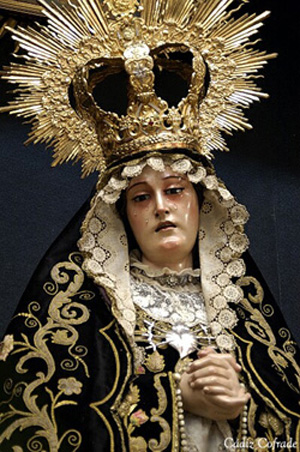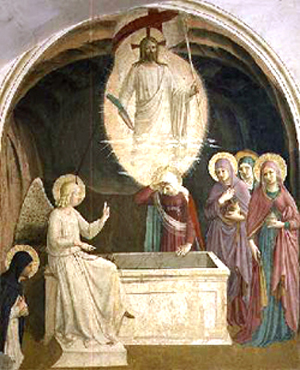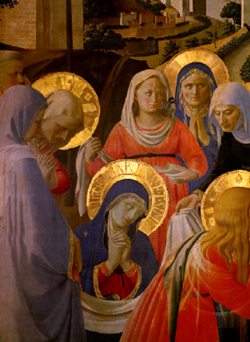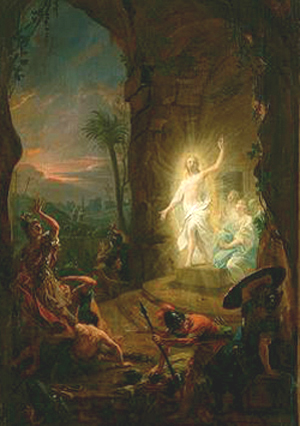 |
Catholic Customs
Why Saturday Is Dedicated to Our Lady
Plinio Corrêa de Oliveira
We know that Friday is the day that reminds us of the death of Our Lord, and Sunday recalls His Resurrection. The question rises: Why is Saturday dedicated to Our Lady? I received the following information that I pass on to you and then comment on it afterward.
Biographical selection:

Our Lady alone maintained faith in the Resurrection |
Devotion to Our Lady received a strong boost at the beginning of the 10th century with the monastic reform that gave shape to Medieval Civilization.
After that epoch it became the general custom to dedicate Saturday to Our Lady. St. Hugh, Abbot of Cluny, ordered that in the abbeys and monasteries of his Order the Office should be sung and a Mass celebrated in honor of Mary Most Holy on Saturdays. A special Mass was composed in her honor for those occasions. To the regular Divine Office, Pope Urban II added the Small Office of Our Lady to be sung on Saturdays.
There are many reasons why Saturday should be dedicated to the Most Holy Virgin. The best known grew from the particular devotion the medieval man had to the Resurrection of Our Lord Jesus Christ. The Gospels tell us that after the death of Our Lord, the Apostles, disciples and Holy Women did not believe in the Resurrection, even though Our Lord had predicted it various times.
Thus, from the hour that Our Lord died on the Cross on Good Friday until the Sunday of the Resurrection, only Our Lady believed in His Divinity and, therefore, only she had perfect faith. For, as St. Paul says: “Without the resurrection our faith would be vain.” On that Saturday, therefore, on the whole earth only she personified the Catholic Church. For this reason medieval man honored her especially on this day.
Comments of Prof. Plinio:
This explanation could not be more beautiful. I believe, however, it is an exaggeration to say that the Holy Women and the Apostle St. John lost the faith on that day. But they did not have faith in the Resurrection.

The Holy Women could not conceive of the Resurrection of Our Lord |
Despite the fact that Our Lord spoke of His Resurrection several times, they did not fully comprehend it. Indeed, a resurrection is such an extraordinary thing, so opposed to the natural order, that the human mind is not inclined to believe in it. Even though Our Lord had raised Lazarus from death – and they had witnessed that miracle – they did not realize that the One who had resurrected Lazarus could resurrect Himself.
It is almost inconceivable for a man to raise a dead man to life; yet it is more difficult to imagine a dead man resurrecting himself. How can a man - through his own power – rise from the deep abyss of death and say to his own soul: “Now, re-enter your body and be one with it”? This demands a much greater power than the one needed to resurrect a dead man. It is one victory on top of another, one splendor multiplied by another, a thing, normally speaking, that the human mind cannot imagine.
We can understand, then, how those who surrounded Our Lady at the foot of the Cross – St. John, the Holy Women and a few others such as Nicodemus – would also accompany her to her house in that hour of supreme sorrow. But they did not truly believe that Christ would rise from death. Our Lady knew and trusted that He would rise from death; the others did not.
Even though they had a supernatural instinct telling them that the history of Our Lord had not yet ended, and that a final word remained to be said, it was only the presence of Our Lady that confirmed them in this instinct, not their faith in the Resurrection. Without this instinct and without Our Lady they would have dispersed completely. When the Gospels report the reaction of St. Mary Magdalene talking to Our Lord after He had risen, they show that she was not expecting Him to rise.

In her greatest desolation, she never lost hope in His promise |
During this period, only Our Lady believed in the Resurrection. Only she had the full faith. On the entire face of the earth she was the only creature with the complete faith, a most perfect faith without any shadow of doubt. Even in the immense sorrow that she suffered for the sin of Deicide, she had absolute certainty of this truth. Serenely and calmly she awaited the hour of the victory that was drawing near. This gave her a great joy amid her sorrows.
Since fidelity is necessary for the world not to end, one can say that, had she not been faithful on that occasion, the world would have ended. If the true faith had disappeared from the face of the earth, then Divine Providence would have ended the world. Thus, because of her fidelity, History continued and the promises of the Old and New Testament affirming that the Messiah would reign over the entire earth and be a King of Glory and the center of History had continuity. Those promises could not be fulfilled without Our Lady’s fidelity in that period.
All those promises lived in her soul. She became the portal for all future hopes. In her soul, like a seed, was all the grandeur the Catholic Church would develop through the centuries - all the virtues the Saints would practice.
So, we can say that these hours of Our Lady’s life are particularly beautiful, perhaps the most beautiful of her life. One could ask whether that time of fidelity was even more beautiful than the period when Our Lord lived in her womb as in a Tabernacle. Was it more beautiful for her to carry the Messiah in her body, or to encompass the Holy Church, the Mystical Body of Christ, in her soul? This is a question that can be discussed.

"It is at night that it is beautiful
to believe in the light" |
Her fidelity brings to mind the words of Edmond Rostand in his Chantecler: “It is at night that it is beautiful to believe in the light.” To believe in the light at noon does not have any particular merit. But to believe in the light at the darkest hour of the night, when one has the impression that everything is plunged into darkness forever, is truly a beautiful thing.
Our Lady believed in the light in that terrible night as she held His dead Body in her lap, as she prepared it with perfumed oils for the sepulcher, as she touched the wounds of His Body witnessing to that tremendous defeat. Even then she believed in the Resurrection, and she made a tranquil act of faith. She considered all those wounds of little import; He had promised He would rise from death, and He would. She believed. She had not the least doubt.
This is indisputably one of the most beautiful times in her life. Since this happened on Holy Saturday, we understand why the Church chose Saturday to commemorate Our Lady. Until the end of the world all Saturdays are consecrated to her. It is just. It fulfills her prophecy in the Magnificat: "All generations will proclaim me blessed."
Application to our fight
Every Saturday the counter-revolutionary has the right to ask Our Lady to have special pity on him because he received a mission analogous to hers. Indeed, we live in a time that is in the full darkness of night. We know that the Catholic Church is immortal but, humanly speaking the traditional Church has disappeared. Further, in almost every sphere of human activity, we only see corruption and misery. All around us immorality, revolt, abjection, egoism, ambition, fraud and despair reign. Everything attests to the almost complete death of Christian Civilization.
There is, however, a vessel of election, a vessel that Our Lady chose to be one of glory and honor, a vessel of chastity and fidelity. In this vessel Our Lady collected the Catholic sense of the past, devotion to her, love for all the Catholic traditions abandoned by others. She also placed in this vessel the hope and certainty of her Reign. It is the vessel of the Counter-Revolution. In this terrible night, through the blessings of Our Lady, the soul of the counter-revolutionary is a link between the past and the future.
One who belongs to this remnant believes in her promise. He has the certainty that the Immaculate Heart of Mary will triumph. This certainty gives him tranquility amid the greatest sufferings, which is a position of soul similar to the one Our Lady had on Holy Saturday.
Until the Reign of Mary comes, we are living a long Holy Saturday where everything that we love lies in the sepulcher - despised, hated and completely abandoned. Nonetheless, we have the certainty that the victory will be ours. She chose us, her counter-revolutionaries, to repeat and imitate her fidelity in our sad times.
This is the prayer we could say to her on Saturdays: O Immaculate and Wise Heart of Mary, make my heart like unto thine. When everything around me affirms the opposite, when the world seems to collapse, the stars fall from the sky and the columns of earth cave in, even in such calamity, give me the serenity, patience, apostolic zeal and courage to affirm: In the end thy Immaculate Heart will triumph.

This commentary by Prof. Plinio Corrêa de Oliveira was translated
from the trascript of the tape and adapted by Atila S. Guimarães
Posted January 1, 2009

Related Topics of Interest
 The Annunciation of the Angel and the Incarnation of the Word The Annunciation of the Angel and the Incarnation of the Word
 The Immaculate Heart of Mary The Immaculate Heart of Mary
 Fatima and the Last Times Apostasy Fatima and the Last Times Apostasy
 Mater Admirabilis: A Goodness that Has No Limits Mater Admirabilis: A Goodness that Has No Limits
 The Grace of Contrition and the Reign of Mary The Grace of Contrition and the Reign of Mary
 Our Lady of Mount Carmel Our Lady of Mount Carmel

Related Works of Interest
|
|
Catholic Customs | Religious | Home | Books | CDs | Search | Contact Us | Donate

© 2002- Tradition in Action, Inc. All Rights Reserved
|
 |
|